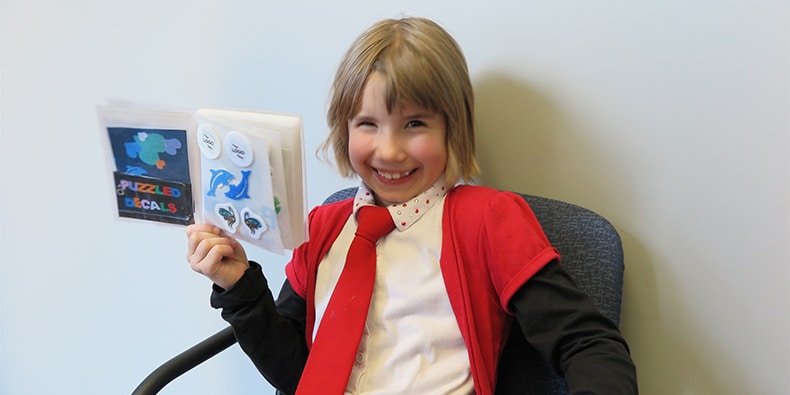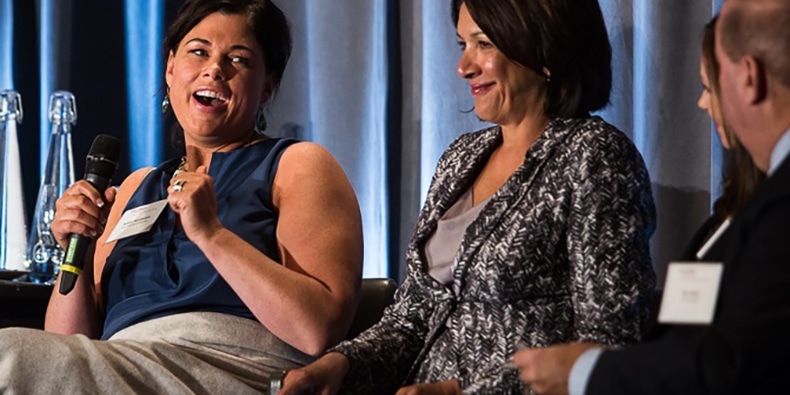Poppy Barley is not just another shoe store, and that is exactly what Justine and Kendall Barber wanted when they started their business. The sisters launched into entrepreneurship with the help of Startup Edmonton in 2012. They found a niche in the women’s shoe market and built a successful, multifaceted business for an underserved market.
Justine and Kendall’s initial plan for the store was to sell exclusively online, but their business model changed and evolved as they listened to their customers and pivoted their sales channels to match demand. They understood that being nimble would help enable their success. We had the opportunity to chat with Justine about the launch of Poppy Barley and the company’s progression over the past five years.
Inspiration Can Come from Anywhere
Originally from Prince George, Justine moved to Edmonton to get her Bachelor of Commerce degree. She then decided to live abroad, completing a Master’s Degree in Belgium, before eventually making her way back to Edmonton. After four years of working in homelessness prevention, affordable housing, and urban revitalization, Justine made the decision to leave her steady job to start Poppy Barley.

Like many entrepreneurs, she and Kendall wanted to work for themselves, be able to make more decisions, and have more autonomy in their work. But why shoes? Justine says, “It was just really the first idea I had… the vision started as an e-commerce custom boots company based on my experience in Bali having a pair of custom boots made for me. I realized that a lot of women struggle to find boots that fit, it wasn’t a product available in the marketplace, and you could use an e-commerce business model to serve those customers.”
E-Commerce vs. Brick-And-Mortar
Justine and Kendall’s original plan for Poppy Barley to be e-commerce only quickly evolved when they realized that people still like to shop in person, especially for shoes: “Initially when we launched, it was all about being e-commerce and that was our plan, but really within the first week we were hosting measuring appointments at our office because people wanted to do it in person.”
From there, the sisters continued to grow the business by experimenting with pop-up shops and a showroom in their Whyte Avenue office, both of which worked well. The duo decided to keep going further and further into retail until they opened their new store at Southgate Centre. They realized there are some distinct advantages to in-person shopping: from the store’s perspective, there are fewer merchandise returns, and generally people spend a bit more money.
Despite their move into retail, Justine and Kendall knew that e-commerce was still essential to Poppy Barley’s success. They were lucky enough to find a great (and affordable) developer through an RFP they sent out while at Startup Edmonton, and they still work with him today. Working with an experienced professional in this area is very important to ensure you get a well-built website with e-commerce capabilities and an excellent user experience.
The biggest challenge in building Poppy Barley’s online store was the requirement to add custom shoe measurements, which meant they had to interrupt the shopping cart. As a result, they chose the WooCommerce e-commerce platform and stayed with it for four years; however, due to the growth of the business, they have made the change to Shopify Plus because it is a more scalable platform.
When considering an online store, Justine advises business owners to consider the extra work required:
“I think the biggest thing about selling online versus retail is that you need to drive all of your traffic. If you open a store in the mall, you’re taking advantage of the fact that a million people a month are visiting the mall. So we’ve really from the beginning relied primarily on social media, word-of-mouth, and press to build awareness, to build community, and that’s something we’re still pretty consistently doing.”
Her strategy to promote Poppy Barley’s online store involves a lot of experimenting with different methods to see what works.
Pivoting Your Business Model
Justine knows that business skills like how to manage sales, inventory, and shipping should not be underestimated, especially in a fashion-based, creative company. Justine and Kendall are both business-minded and enjoy those details, so aren’t daunted when planning the logistics. They spend a lot of time on inventory management and planning because the fashion industry tends to have a negative cash flow cycle. If you’re over-buying or not managing inventory correctly, it can lead to bankruptcy. Justine admits they’ve definitely gotten better and learned as they’ve gone.

Justine recognizes that “the number one challenge I think every business has is cash flow. You’re trying to stay alive while you learn your business model, learn how to acquire customers, and improve your product or change your product to suit your customers.”
Poppy Barley’s business model has also changed from all custom-made footwear to a mixture of about 30% in-stock accessories, 50% in-stock finished footwear, and 20% made-to-order footwear. So while they mainly sell pre-made stock, they also keep raw materials in inventory for made-to-order items. Justine and Kendall decided to make the switch in 2015 to accommodate customers who could buy off the shelf and did not want to wait weeks for custom-made shoes. This business model gave them more flexibility, especially to sell in shopping centres.
Looking into the Future
Justine and Kendall are excited for the future as they continue to expand Poppy Barley’s brand awareness and become a national brand. They also want to increase the company’s product diversification and continue to become a more sustainable business.
Poppy Barley products are currently sold in Canada and the US, and there are no immediate plans to go beyond that. Instead, they plan to capitalize on the potential and growth in Edmonton and Calgary, and across Canada and the US.
While the sisters enjoy a fair amount of press, like when the federal Finance Minister wore their shoes while delivering this year’s budget, Justine says: “In my experience, at least so far, there’s been no magical moment… You know where like Oprah says that you’re awesome and then you’re famous. I think that maybe happens occasionally, but for the most part you just need to be building all the time.”
There has been a huge surge in the popularity of buying local products, with local stores like Poppy Barley opening in major shopping centres, and pop-up shops and markets happening across the province. Justine sees this change as positive: “I think it’s a really interesting movement with people going back to the roots of who’s making things.”
Follow Poppy Barley’s story on social!






